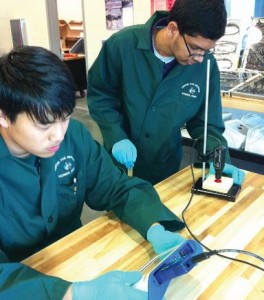As an educator, parent or concerned citizen, you know that the current state of STEM education in the United States is very poor. We live in a country where every day thousands of students drop out of school. It’s hard to believe that even today students do not graduate from high school. Of those who do graduate, many are not adequately prepared for college. Add to that the fact that a simple high school diploma will not be enough to guarantee success in the 21st-century workplace, and we are in trouble. It is clear that we need to take action and prepare our students better. This is where Advanced Career (AC) comes in.
SREB Advanced Career
T he Southern Regional Education Board (SREB), working with states and industry, considered all these factors and hit the ground running to create a solution. SREB designed the AC initiative to help all students prepare better for more options after high school: jobs, advanced training, community/technical college, etc. AC instills a “no child (or in this case, no student) left behind” philosophy. This program is designed to help all types of students. The project-based learning pedagogy is especially helpful to those students who are tactile learners and thrive in a contextual learning environment. These unique methods capture students’ attention to engage them more fully in the learning process. The program welcomes all types of students, including those who want to pursue higher education and those who want to get started with their careers. AC combines college-ready academic and technical content in a four-course sequence designed around authentic, hands-on, project-based assignments that motivate and prepare students for the steps ahead.
he Southern Regional Education Board (SREB), working with states and industry, considered all these factors and hit the ground running to create a solution. SREB designed the AC initiative to help all students prepare better for more options after high school: jobs, advanced training, community/technical college, etc. AC instills a “no child (or in this case, no student) left behind” philosophy. This program is designed to help all types of students. The project-based learning pedagogy is especially helpful to those students who are tactile learners and thrive in a contextual learning environment. These unique methods capture students’ attention to engage them more fully in the learning process. The program welcomes all types of students, including those who want to pursue higher education and those who want to get started with their careers. AC combines college-ready academic and technical content in a four-course sequence designed around authentic, hands-on, project-based assignments that motivate and prepare students for the steps ahead.
What Students and Teachers Say About Advanced Career
 The AC has program has inspired success among students at schools that have implemented this curriculum. Can you imagine teaching students who come in early to get started on their projects and stay late to finish them? This is happening. Students are impressed that leading industry personnel, along with educators, are the ones creating these courses that will prepare them for the high-demand career fields they’re interested in. They are motivated to do well and can actively see how this training will benefit their futures. Students learn to apply information gained from academic disciplines such as mathematics, science and English/Language Arts. Jeff Broschart of Randolph Technical Center reports, “Our AC students are eager to learn and to apply what they studied in other courses.” He mentioned that his students have enthusiastically correlated what they’ve learned in other classes to the AC courses. One of his students even said, “I had this in math, and now I see why I learned it.” To learn how other educators are using AC, review these vignettes.
The AC has program has inspired success among students at schools that have implemented this curriculum. Can you imagine teaching students who come in early to get started on their projects and stay late to finish them? This is happening. Students are impressed that leading industry personnel, along with educators, are the ones creating these courses that will prepare them for the high-demand career fields they’re interested in. They are motivated to do well and can actively see how this training will benefit their futures. Students learn to apply information gained from academic disciplines such as mathematics, science and English/Language Arts. Jeff Broschart of Randolph Technical Center reports, “Our AC students are eager to learn and to apply what they studied in other courses.” He mentioned that his students have enthusiastically correlated what they’ve learned in other classes to the AC courses. One of his students even said, “I had this in math, and now I see why I learned it.” To learn how other educators are using AC, review these vignettes.
• Energy and Power at Randolph Technical Center in West Virginia
• Energy and Power at Lewis County High School in West Virginia
• Innovations in Science and Technology in Arkansas
• Clean Energy Technology Course in South Carolina
• Aeronautics Engineering Applications Course in Alabama
Share this Post
